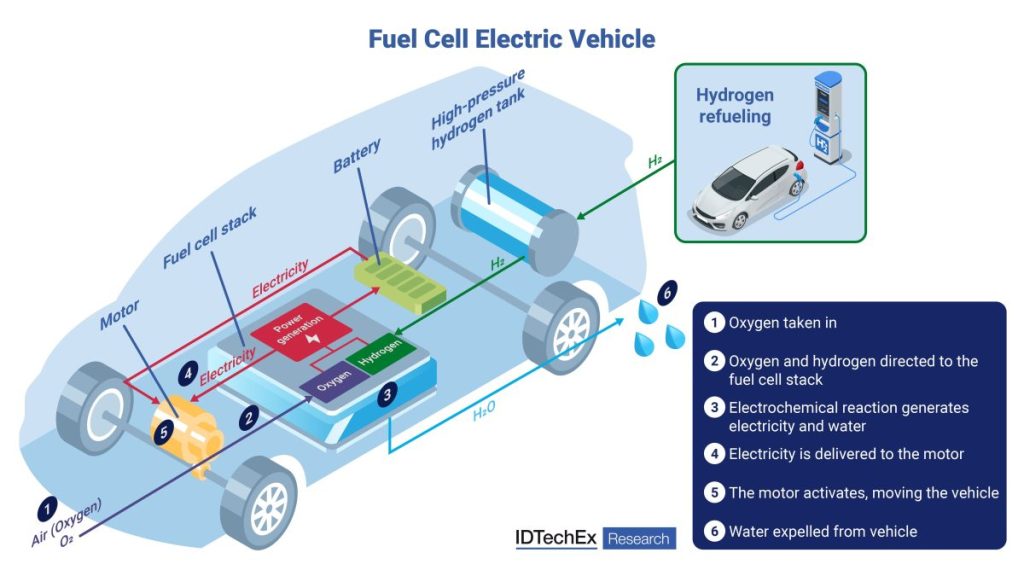
Cambridge — Fuel cell electric vehicles (FCEVs) continue to sell in the thousands, while battery electric vehicle (BEV) sales exceeded 10 million in 2024. A common argument is that battery electric powertrains are simply much more efficient than both internal combustion engine (ICE) vehicles and FCEVs.
IDTechEx’s analysis shows that triple the energy supplied to a BEV reaches the wheels compared to an FCEV. While this is certainly important, it does not tell the whole story. IDTechEx analyzes both the advantages and disadvantages of fuel cell vehicles in its report, “Fuel Cell Electric Vehicles 2025-2045: Markets, Technologies, Forecasts”. The report provides granular forecasts, highlighting the market demand in each vehicle segment, as well as the accompanying demand for fuel cells and batteries.
Charging power is increasing rapidly
BYD made headlines in March 2025 by revealing its MW level charger for passenger vehicles. To top it off, it has stated its plans to build 4,000 of these chargers in 2025. With vehicles being able to fully charge in approximately five minutes, the question arises whether there really is any advantage of FCEVs over BEVs in terms of refueling.
Furthermore, while the number of hydrogen refueling stations has stagnated in all key regions outside of China and South Korea, access to DC fast chargers continues to increase in key passenger car markets.
The challenges of high power charging
However, access to such fast DC chargers comes at a cost. Charging stations will need to be built to handle the peak demands of constant high-power charging. Furthermore, most areas do not have the necessary grid connections and infrastructure currently to support high-power levels of charging, such as MW charging proposed by BYD and as used in the MCS charging standard for trucks. T
o put this in context, National Grid estimates that the power consumption of a small town is 20MW, meaning that a car or truck stop with multiple charging posts will require a comparable peak power demand as a small town. Grid upgrades can cost upwards of US$100,000s and can take many months to years, depending on the scale of the upgrade and the time scale of planning and building. To tackle the high power demand, stationary energy storage solutions are being developed that can shave the power demand at peak times.
The scalability of hydrogen refueling
For hydrogen refueling stations, hydrogen is stored onsite, meaning that even if green hydrogen is generated onsite (and therefore constant power is required), you can more easily store the energy content of the hydrogen fuel on site compared to electricity, meaning that peak power demand is significantly reduced when compared to DC fast charging stations.
For stations where hydrogen fuel can be delivered by tube trailers, the limit of potential energy available at the station is limited to the mass of hydrogen that the tube trailers can transport.
In the future, hydrogen pipelines will be built to create a network of infrastructure capable of consistently supplying hydrogen. However, hydrogen refueling stations usually take multiple years to go from planning stages to finished construction. Just like MW charging stations, hydrogen refueling stations are also very CAPEX-intensive, requiring equipment for hydrogen generation, transport, compression, and storage.
Conclusions
The question of the future availability of green hydrogen remains a concern. Without access to large quantities of cost-effective, low-carbon hydrogen, it is unlikely that FCEVs will be taken up in significant numbers, and questions would remain on the overall sustainability benefit if grey hydrogen remains the dominant form.
Currently, hydrogen refueling stations struggle to be profitable, due to high running costs and small volumes of FCEVs on the roads to serve. In the future, industries with demand for hydrogen, potentially oil refineries or in steelmaking, could be leveraged to make hydrogen fuel available and cost-effective for FCEVs.
*John Li, Technology Analyst – IDTechEx


